Hard Times (1975)
Directed by: Walter Hill
Written by: Bryan Gindoff, Walter Hill
Starring: Charles Bronson, James Coburn, Jill Ireland, Strother Martin
USA
AVAILABLE ON DUAL FORMAT BLU-RAY AND DVD: 24th April, from EUREKA ENTERTAINMENT
RUNNING TIME: 91 min
REVIEWED BY: Dr Lenera, Official HCF Critic
During the American Depression, down-in-his-luck Chaney arrives at a town somewhere in Louisiana, jumping down from a boxcar and soon coming upon a bare-knuckle street fight ran by gamblers. After the bout, he asks the fast-talking Spencer Weed, nicknamed “Speed”, the backer of the losing fighter, to set up a fight for him, which Speed does. When Chaney dispatches his younger opponent with a single punch, Speed offers to become Chaney’s manager. They travel to New Orleans and Speed recruits the genteel but slightly decrepit and opium-addicted Poe as cutman. Unfortunately, Speed is already in debt to local landshark Doty, and has to borrow even more money off him to set up a fight against local champion Jim Henry….
Many years ago I had a friend who loved Charles Bronson – I mean really loved him. He’d go on about all his films, every one of which he had on video, and persisted in lending them to me. I didn’t really become a convert – I found Bronson to be okay and most of the films to be okay, but no more. It was only Once Upon A Time In The West where I really thought he and the film were great, and I’d already seen that. This friend often mentioned how good he thought Hard Times was, and how it had Bronson’s best performance. Unfortunately, he was such a fan that he refused to lend that particular movie to me. Fast forward to now, and I finally get to see Hard Times, and he was right. Bronson is quietly sensational in this film, his laconic screen presence and weather beaten face being put to terrific use by Walter Hill [The Warriors, Streets Of Fire, Southern Comfort] in his highly impressive directorial debut in which he shows right away a mastery of filmmaking, and with much of his style already in place. There’s something very honest about this lean, paired down Depression-set drama as its two heroes [or rather anti-heroes] try to make some cash in a world where the dollar bill and the fist rule, though Hill is clearly already interested in mythic archetypes.
Hill had developed a strong reputation as a screenwriter, and so was given a chance to direct one of his scripts, though what was initially called The Streetfighter began as an original screenplay by Bryan Gindoff and Bruce Henstell set in the present day. Hill thought the project could become more “up market” if he made it more like a Western and set it in the past, and also incorporated elements of an earlier Western he had written, Lloyd Williams and his Brother, into his much changed own version of the script. He originally intended for Jan Michael Vincent and Warren Oates to play the two lead roles eventually played by Bronson and James Coburn. Being a chain smoker, 52 year old Bronson, who kept himself to himself on set unlike Coburn who got along well with everybody, had little stamina and couldn’t fight for much longer than 30 seconds. The first cut of the film was around two hours long, and lost several fights [for which some stills exist] to get it down to an hour and a half. Also cut were some scenes featuring Jill Ireland who was Bronson’s wife; due to this and Hill telling him that her performance wasn’t too good, Bronson later refused several offers from Hill to work with him again. The Streetfighter title was changed to The Street Fighter because of the Sonny Chiba film of the same title which has just come out, and to Hard Times in the UK.
Chaney is first seen casually standing in a train boxcar before jumping out. We instantly pick up on the suggestion that the next hour and a half may not be a big deal in this man’s life, just as when we first encounter Clint Eastwood’s The Man With No Name. Chaney has a coffee in a bar and asks the waitress where some men seem to be going. She tells him and comes across a street brawl, eventually participating in a fight himself and winding up with slick promoter Speed, the two of them then going to New Orleans. I actually chuckled at Chaney’s extreme laid-back nature. “ Are we going to see you again Mr. Chaney”? asks Speed’s girlfriend Gayleen Schoonover. “I might show up “ replies Chaney. Chaney doesn’t seem to like being around people much, and from what little I know of Bronson the role of Chaney seems quite close to Bronson himself. Speed recruits old friend Poe [most of the characters just have first names in this movie] as cutman [“I spent two years in medical school. In the third year, a dark cloud appeared, and I left under it”], and the stage seems set for success what with Chaney’s fighting prowess. However, in this world there’s a chance that somebody won’t pay up after losing. And it soon becomes apparent that Speed is a compulsive gambler, and thereby liable to blow money as soon as he wins it despite loan sharks circling around him.
Hard Times holds off on the fighting for a while. The first brawl consists of just one hit, and the second is over in about 20 seconds. When Chaney at last seems to have a bit of a challenge, I was hugely impressed by what seemed to me more realism in this kind of thing than is usual in American movies, especially with the way Chaney does his very best to actually avoid getting the kind of repeated blows that we often see movie fighters take and still keep standing but which would actually more likely be knocked unconscious or even dead. The mixture of rough brawling with a few actual techniques is also very impressive and convincing, and I also liked how it emphasises honour between fighters, the real nasties being the so-called human beings who watch and jeer. Of course Hard Times isn’t just a fight movie and is as much about “the in-betweens”, to quote the film. It’s possible that some newcomers to this film may find it a bit irritating that characters often don’t actually say what they should, or in Chaney’s case prefer to say nothing at all. Chaney begins a relationship [if you can call it that] that seems so just be based on mutual need, with a woman named Lucy Simpson whose husband is in prison. Eventually tired of his noncommittal attitude [he doesn’t even like to stay the whole night], she is found to have gotten herself somebody else when Chaney pays his next visit. Chaney doesn’t seem much bothered, and their farewell consists of a few lines where neither character seems to say what they actually want to, and there’s certainly no big melodrama. We’re used to films today with characters who always spell everything out, and yet in some ways the approach taken by Hard Times, which was very common in the 1970’s, may be more realistic. How many times have we spoken with someone and avoided saying what we should have said?
We learn little of Chaney’s background, but are able to pick up on little hints. There’s an excursion into a bar where Chaney has no bones about beating up some people and partly shooting up the place. This suggest to us that this is a man very used to violence and using force as a means to an end, and not just of the street fighting kind. Then there’s a small moment where he passes by a bear in a cage, and seems to look upon it with pity before moving on. Much of Hard Times is like this, comprised of tiny vignettes which might just possibly tell us more about a character than they seem. The film has little in the way of narrative drive, and the prevalent browns and grays everywhere don’t make for the most appealing visual experience, and yet we are always made to feel that we are in the period and the environment in which the film is despite the moderate budget that Hill had at his disposal. Hill and cinematographer Philip H. Lathrop keep things clean and unobtrusive, with slow camera moves and great use of wide overhead shots during the final fight.
Bronson, playing the first of Hill’s existential heroes with no distinct past, and Coburn, in their third film together, make a good pairing and look forward to several similar ones in subsequent Hill pictures, despite Coburn apparently resenting the fact that he was playing second fiddle to Brosnon. Chaney seems to have built a wall around him so nobody can get close, and even though he’s the kind of guy who will respect you if he thinks you’ve earned it, his final act in the film is quite a surprise. On the other hand Speed is very sociable even though he has rather too big a mouth. I didn’t feel that I liked Speed as much as I wanted to, and at times he seemed to me to be an annoyance despite Coburn’s charisma, to the point that I wondered why Chaney was sticking with him. Of course I mustn’t fail to mention Strother Martin, an actor I normally see playing horrid villains, as poor Poe who’s nonetheless given some of the script’s best lines. “Some are born to fail, others have it thrust upon them”. Hill was right – Ireland is rather weak in her part, but there are some interesting faces in the supporting cast, including Mr Wint himself Bruce Glover as another slimy heavy. Hard Times is a film full of notable details, little moments that stick in the mind, and yet its almost complete lack of exposition and background leaves you asking more questions than when you started watching it. It also doesn’t seem to have much of an opinion on anything. But that can be a good thing in a film which understands that, for example, one line of dialogue can sometimes mean a whole paragraph, that one look can sometimes mean the world. It just depends if the viewer is game. Hard Times is a fine film, Bronson is very good, and I wish that my friend was still around for me to tell him.
Rating: 









Eureka’s Blu-ray of Hard Times overcomes the film’s very dour look in what is a very fine presentation with considerable clarity and depth. While the Region ‘A’ Twilight Time release had an isolated score option, Eureka’s gives us far more, beginning with a very interesting interview with Hill from 2012 where he talks about his career and approach to filmmaking. Then we have 20 or so minutes of Hill talking about the film, especially its genesis, which initially wasn’t listed as being amongst the special features so must have been a last minute addition. Brosnon sounds like a pain to work with – rarely sociable, yet impatient for the next take. Next we have producer Lawrence Gordon who takes a similar approach but tells of a few different things, and finally composer Barry DeVorzon who is very interesting to listen to. Apparently he hated the way he was forced to use a song on Dillinger, but the first thing Hill said when he met him was how he loved the employment of said song in that score! A good release of a generally respected film, but one which not enough people seem to have heard of or seen [it was rarely mentioned when Bronson died].
SPECIAL FEATURES
*New 4K restoration
*Uncompressed PCM and 5.1 DTS-HD Master Audio soundtrack on the Blu-ray
*English subtitles for the deaf and hearing-impaired
*NFT Audio Interview with director Walter Hill
*A new interview with Walter Hill
*A new interview with producer Lawrence Gordon
*A new interview with composer Barry DeVorzon
*Original theatrical trailer
*PLUS: A booklet featuring new and archival writing

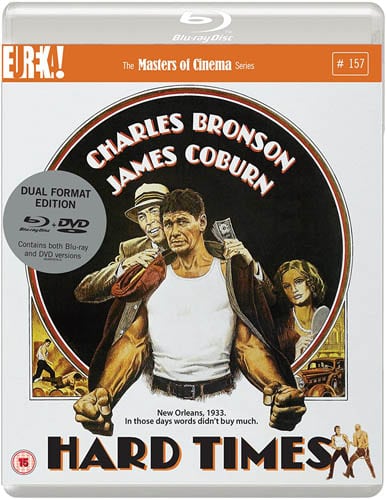

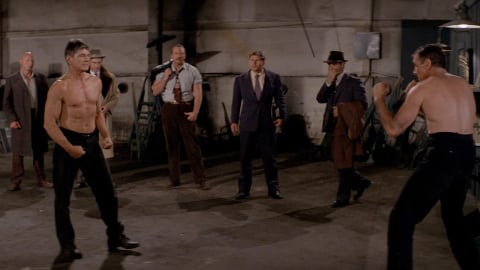

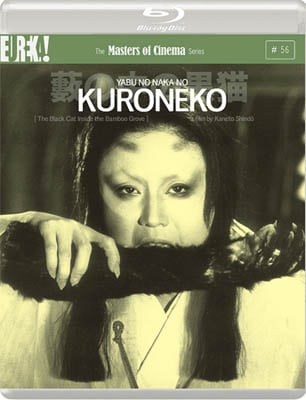
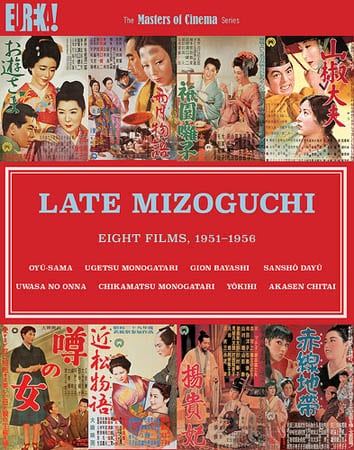
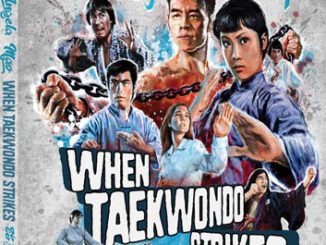
Be the first to comment